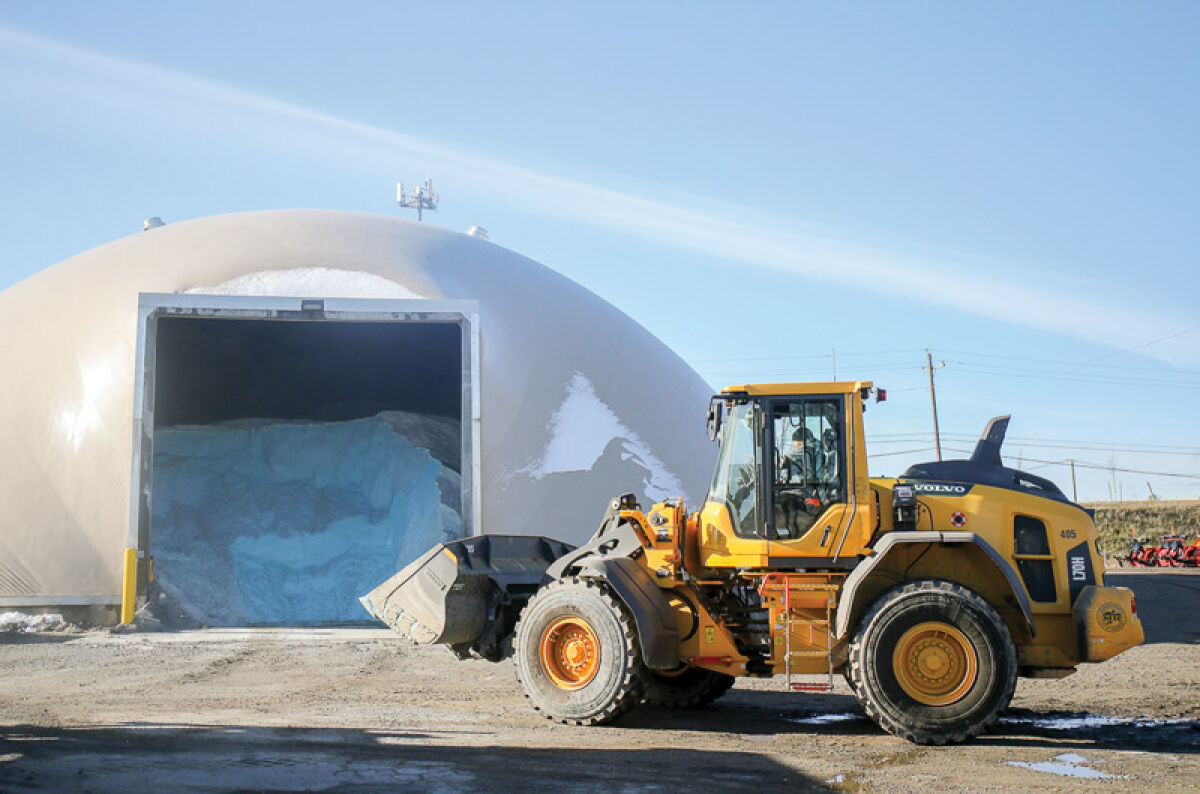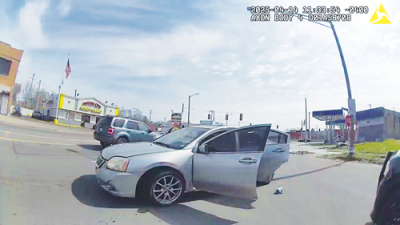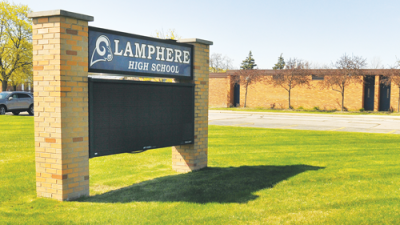MADISON HEIGHTS — With winter underway, officials at the Madison Heights Department of Public Services say they’re ready for the worst. January has already seen its share of snow and bitter cold, although the forecast is for a warmer season overall.
“The general consensus is we are in a strong El Nino pattern this winter, so we are expecting a milder winter with warmer temperatures, and generally less snow than normal,” said Madison Heights DPS Director Sean Ballantine, in an email. He said this follows a trend the last few years. “That said, we remain ready for anything that comes our way.”
In the 2022-23 winter season, there were 14 snow events and two snow emergencies. Ballantine said that the Madison Heights DPS used around 1,800 tons of salt to melt ice on the roads — well below the five-year average of 2,600 tons and the 15-year average of 3,700 tons.
At the start of November 2023, the DPS had 3,860 tons of salt in the dome. There was one weather event in late November. Since then, another 2,500 tons have been ordered to help keep the city stocked through the winter season.
Ballantine said that 1,500 to 2,500 tons are expected to be used in a mild winter. The city has also equipped each of its salt trucks with brine systems that wet the salt as it spreads, creating a stronger solution. The DPS manufactures its own brine at a cost of about 1 cent per gallon.
At the ready are five tandem-axle dump trucks and four single-axle dump trucks that are equipped to salt, and that have any combination of underbody scrapers, wing plows and front plows. For plowing snow, there are three 1-ton dump trucks and 11 pickup trucks equipped with plows. There are also four smaller pieces of powered equipment to handle sidewalks and park trails.
The DPS has a staff of 18 equipment operators and foremen trained to remove snow, plus two mechanics and a motor pool supervisor who keep the fleet in good condition. The city does not currently use private contractors.
“I think our DPS staff are the unsung heroes of public safety, because slick roads and tough weather conditions cost lives,” said Mark Bliss, the mayor pro tem of Madison Heights. “The detail, focus and speed at which they do their jobs to make our roads as safe as possible is second to none. When you cross over into other communities, you typically see a significant difference in the roads, and that’s because of the care our DPS staff puts into them here. I think the way our residents cooperate by ensuring their vehicles are off the roads is also critical.”
Ballantine said that a typical snow event is triggered when road patrol officers contact dispatch and notify them that road conditions are beginning to deteriorate. Dispatch then contacts the on-call supervisor at the DPS, and a crew is immediately mobilized whether it’s day or night.
The DPS supervisor monitors the weather forecast and road conditions to determine the best course of action between just salting, or plowing and then salting. If a significant storm is predicted and clearly heading toward the city, the supervisor confers with the DPS director, coordinating the crew’s response.
“Their diligence ensures that our roadways are clear, and their efforts contribute significantly to our overall quality of life,” said Madison Heights City Councilman Quinn Wright, in an email.
The city has a long-standing winter maintenance agreement with both Oakland and Macomb counties for the maintenance of county roads, including 12 Mile, 14 Mile, John R from Dartmouth to 14 Mile roads, and Dequindre from 10 Mile to 14 Mile roads. These are considered major roads and are given first priority for salting and plowing. From there, the priority shifts to secondary routes — typically ones used by school buses — and other residential streets.
“The general intent is that a resident is never overly far from a salted road,” Ballantine said.
Another crew is called in to plow and salt all city facility parking lots, sidewalks and entrances. During a snow emergency, which is declared when either 4 inches of snow have fallen or are predicted to accumulate within a 24-hour period, crews will plow all residential roads, curb to curb, once the major roads are under control.
No notification to residents is required for a normal snow event, but during a snow emergency, notification is sent out to local TV and radio stations, posted on the city’s website and social media, and also disseminated through the Nixle and NotifyMe alert systems.
“I would highly recommend that residents sign up for these in order to stay informed about snow events, water main breaks, holiday schedule changes for garbage days, and other important information about city operations,” Ballantine said.
More information is available at madison-heights.org.
Once a snow emergency is declared, residents have six hours to remove their vehicles from the street so that plow trucks have room to operate. Ballantine said that the city has a reputation for the quality of its snow removal, and endeavors to maintain that high standard. He credits both the current staff for this success, as well as the long-retired supervisors and employees who first devised the routes and processes the DPS still uses today.
“These men and women are on call 24/7 to respond at a moment’s notice in service of the public,” Ballantine said. “I have worked alongside this staff as I came up through the ranks, and can only say that they are top-notch, each and every one of them. I am, and continue to be, immensely proud of them, and the important work that they accomplish.”
Madison Heights City Councilman Sean Fleming said he’s thankful the DPS puts in the time.
“They get up in the early morning hours to respond to snowstorms. They’re out there when we have downed lines, water main breaks. Usually, it’s not happening during their regular business hours. And they’re also working on projects like newer sewer lines,” Fleming said. “So they’re very active — probably the most active group you’ll see on the roads, along with police.”
Madison Heights Mayor Roslyn Grafstein agreed.
“I always think of DPS as part of our emergency team. If you don’t maintain our roads and clear them of snow and ice in bad weather, our police officers and firefighters would not be able to get out to help when they are needed,” Grafstein said via email. “I appreciate that they put in the hours needed to keep everything moving.”
Bliss shared a special word of appreciation for Ballantine.
“He’s a resident of our city, and he treats these roads like they’re his own driveway,” Bliss said with a laugh. “His leadership has made a significant impact that is tangible when you’re out driving on our roads.”
 Publication select ▼
Publication select ▼



















